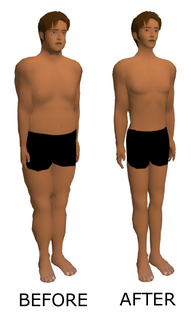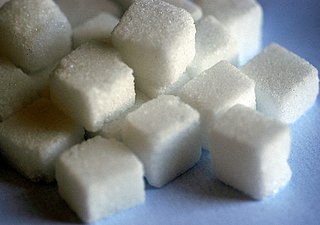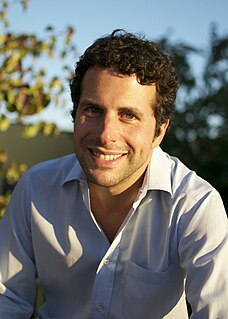
Sucralose is an artificial sweetener and sugar substitute. The majority of ingested sucralose is not broken down by the body, so it is noncaloric. In the European Union, it is also known under the E number E955. It is produced by chlorination of sucrose, selectively replacing three of the hydroxy groups in the C1, C4, and C6 positions to give a 1,6-dichloro-1,6-dideoxyfructose–4-chloro-4-deoxygalactose disaccharide. Sucralose is about 320 to 1,000 times sweeter than sucrose, three times as sweet as both aspartame and acesulfame potassium, and twice as sweet as sodium saccharin.

The Atkins diet is a low-carbohydrate fad diet devised by Robert Atkins in the 1970s, marketed with claims that carbohydrate restriction is crucial to weight loss and that the diet offered "a high calorie way to stay thin forever".

Weight loss, in the context of medicine, health, or physical fitness, refers to a reduction of the total body mass, by a mean loss of fluid, body fat, or lean mass. Weight loss can either occur unintentionally because of malnourishment or an underlying disease, or from a conscious effort to improve an actual or perceived overweight or obese state. "Unexplained" weight loss that is not caused by reduction in calorific intake or exercise is called cachexia and may be a symptom of a serious medical condition.

A fad diet is a diet that becomes popular for a short time, similar to fads in fashion, without being a standard dietary recommendation, and often making unreasonable claims for fast weight loss or health improvements. There is no single definition of what is a fad diet. The term fad diet encompasses a variety of diets with different approaches and evidence bases, and thus different outcomes, advantages, and disadvantages.

Morgan Valentine Spurlock is an American documentary filmmaker, humorist, television producer, screenwriter and playwright.

Steven David Levitt is an American economist and co-author of the best-selling book Freakonomics and its sequels. Levitt was the winner of the 2003 John Bates Clark Medal for his work in the field of crime, and is currently the William B. Ogden Distinguished Service Professor of Economics at the University of Chicago as well as the Faculty Director and Co-Founder of the Center for Radical Innovation for Social Change at the University of Chicago which incubates the Data Science for Everyone coalition. He was co-editor of the Journal of Political Economy published by the University of Chicago Press until December 2007. In 2009, Levitt co-founded TGG Group, a business and philanthropy consulting company. He was chosen as one of Time magazine's "100 People Who Shape Our World" in 2006. A 2011 survey of economics professors named Levitt their fourth favorite living economist under the age of 60, after Paul Krugman, Greg Mankiw and Daron Acemoglu.

Freakonomics: A Rogue Economist Explores the Hidden Side of Everything is the debut non-fiction book by University of Chicago economist Steven Levitt and New York Times journalist Stephen J. Dubner. Published on April 12, 2005, by William Morrow, the book has been described as melding pop culture with economics. By late 2009, the book had sold over 4 million copies worldwide. Based on the success of the original book, Levitt and Dubner have grown the Freakonomics brand into a multi-media franchise, with a sequel book, a feature film, a regular radio segment on National Public Radio, and a weekly blog.

In human nutrition, empty calories are those calories found in beverages and foods composed primarily or solely of sugars and/or certain fats and oils such as cholesterol, saturated or trans fats, that provide little to no useful nutrients such as protein, fiber, vitamins, minerals, essential fatty acids, or antioxidants Foods composed mostly of empty calories have low nutrient density, meaning few nutrients relative to their energy content. The consumption of large amounts of empty calories can have negative health consequences.
Self-experimentation refers to the special case of single-subject research in which the experimenter conducts the experiment on themselves.
The Hay Diet is a nutrition method developed by the New York physician William Howard Hay in the 1920s. It claims to work by separating food into three groups: alkaline, acidic, and neutral. Acid foods are not combined with the alkaline ones. Acidic foods are protein rich, such as meat, fish, dairy, etc. Alkaline foods are carbohydrate rich, such as rice, grains and potatoes. It is also known as the food combining diet.
The Cambridge Diet was a very-low-calorie meal replacement fad diet developed in the 1960s. The diet launched with different versions in the US and the UK. The US version filed for bankruptcy and shut down shortly after the deaths of several dieters. The UK diet has also been known as the Cambridge Weight Plan, but is now known as The 1:1 Diet.
Henry Farrell is an Irish-born political scientist at Johns Hopkins University. He previously taught at the University of Toronto and earned his PhD from Georgetown University. His research interests include, trust and co-operation; E-commerce; the European Union; and institutional theory.

Wilbur Olin Atwater was an American chemist known for his studies of human nutrition and metabolism, and is considered the father of modern nutrition research and education. He is credited with developing the Atwater system, which laid the groundwork for nutrition science in the United States and inspired modern Olympic nutrition.

Sudhir Alladi Venkatesh is an American sociologist and urban ethnographer. He is William B. Ransford Professor of Sociology & African-American Studies at Columbia University, a position he has held continuously since 1999. In his work, Venkatesh has studied gangs and underground economies, public housing, advertising and technology. As of 2018, he is the Director of Signal: The Tech & Society Lab at Columbia University.

Gary Taubes is an American journalist, writer, and low-carbohydrate / high-fat (LCHF) diet advocate. His central claim is that carbohydrates, especially sugar and high-fructose corn syrup, overstimulate the secretion of insulin, causing the body to store fat in fat cells and the liver, and that it is primarily a high level of dietary carbohydrate consumption that accounts for obesity and other metabolic syndrome conditions. He is the author of Nobel Dreams (1987); Bad Science: The Short Life and Weird Times of Cold Fusion (1993); Good Calories, Bad Calories (2007), titled The Diet Delusion (2008) in the UK and Australia; Why We Get Fat: And What to Do About It (2010); The Case Against Sugar (2016); and The Case for Keto: Rethinking Weight Control and the Science and Practice of Low-Carb/High-Fat Eating (2020). Taubes's work often goes against accepted scientific, governmental, and popular tenets such as that obesity is caused by eating too much and exercising too little and that excessive consumption of fat, especially saturated fat in animal products, leads to cardiovascular disease.

The Shangri-La Diet is both the name of a book by the psychologist Seth Roberts, a professor at Tsinghua University and professor emeritus at UC Berkeley, and the name of the diet that the book advocates. The book discusses consuming 100–400 calories per day in a flavorless food such as extra light olive oil one hour outside of mealtimes as a method of appetite suppression leading to weight loss.

Robin Goldstein is an American author, food and wine critic, and economics pundit. He is known for his books and articles questioning conventional wisdom and pricing in the food and wine industries, particularly a widely publicized exposé of Wine Spectator magazine, and for his writing on the Freakonomics blog. He is author of several books, including The Wine Trials and The Beer Trials. Goldstein was also one of the subjects of Think Like a Freak, the 2014 book by Freakonomics authors Steven Levitt and Stephen Dubner.

SuperFreakonomics: Global Cooling, Patriotic Prostitutes, and Why Suicide Bombers Should Buy Life Insurance is the second non-fiction book by University of Chicago economist Steven Levitt and The New York Times journalist Stephen J. Dubner, released in early October 2009 in Europe and on October 20, 2009 in the United States. It is a sequel to Freakonomics: A Rogue Economist Explores the Hidden Side of Everything.
"A calorie is a calorie" is a tautology used to convey the thermodynamic concept that a "calorie" is a sufficient way to describe the energy content of food.














